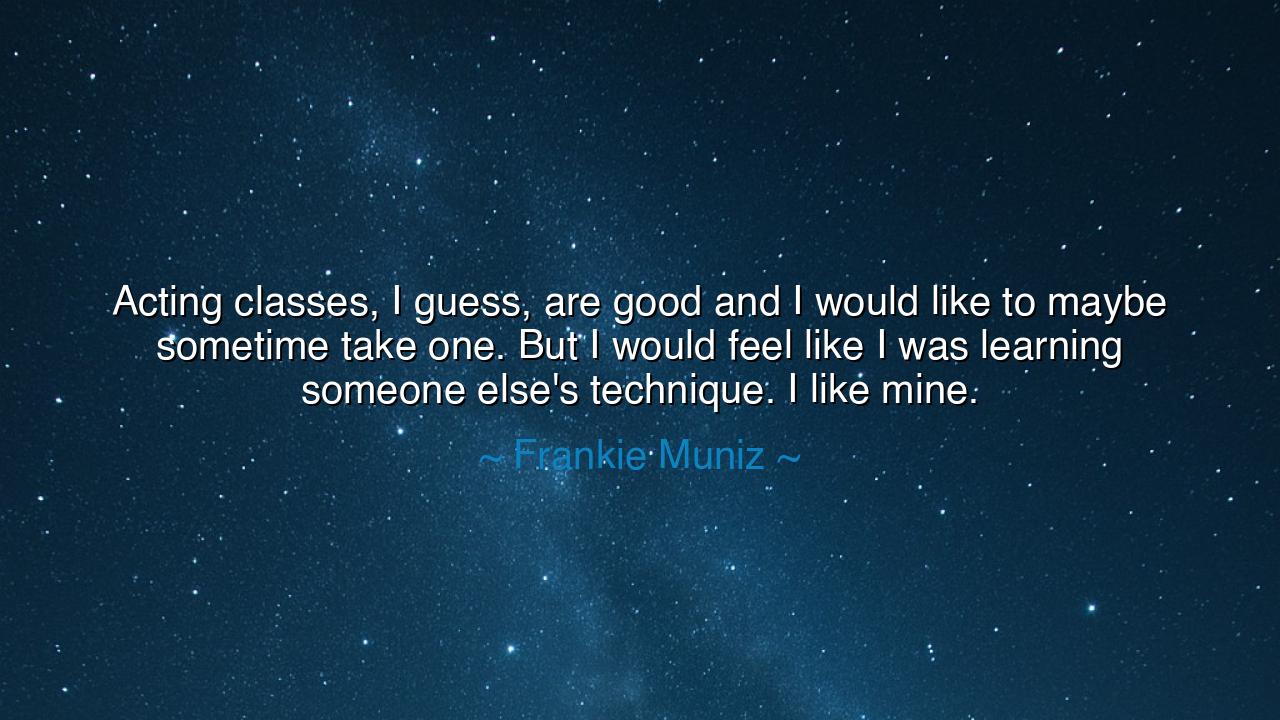
Acting classes, I guess, are good and I would like to maybe
Acting classes, I guess, are good and I would like to maybe sometime take one. But I would feel like I was learning someone else's technique. I like mine.






In a voice humble yet defiant, Frankie Muniz once said, “Acting classes, I guess, are good and I would like to maybe sometime take one. But I would feel like I was learning someone else’s technique. I like mine.” Beneath these simple words lies a powerful declaration of artistic independence—the courage to trust one’s own voice amidst a world eager to shape it. Muniz, known for his natural and instinctive performances, speaks here not against learning, but against losing the self in imitation. His statement is an ode to authenticity, to the inner compass that guides every true artist toward their unique expression.
The origin of the quote springs from Muniz’s early career as a self-taught actor, one who rose to fame without formal training. From his childhood role in Malcolm in the Middle to later performances, he relied not on method or mimicry, but on instinct—on the raw honesty of being present in each moment. In an age where art is often dissected, systematized, and taught like mathematics, his words remind us that creativity is not a formula to be memorized, but a flame to be tended. “I like mine,” he says—not out of arrogance, but from the wisdom of knowing that the truest art comes from within.
The ancients knew this truth well. The Greek sculptor Phidias, who carved the Parthenon’s divine figures, once said that he did not learn to make beauty by studying others, but by gazing into the essence of the gods themselves. His teachers gave him tools, but not vision. Likewise, Muniz’s words suggest that while schools and masters can teach technique, soul cannot be taught. Every person carries within them a distinct rhythm, a voice that must not be drowned by the chorus of conformity. The danger, he implies, is not ignorance—but imitation.
There is a lesson in the story of Vincent van Gogh, too, who painted not with the precision of the academies, but with the pulse of his own heart. His brushstrokes defied convention, his colors broke rules, and for that, the world at first rejected him. Yet time revealed what structure could not: that authenticity is the lifeblood of greatness. Like Van Gogh, Muniz reminds us that to create without fear of being different is to stand in the lineage of all who have dared to be themselves. The artist’s task is not to replicate perfection, but to reveal truth.
And yet, Muniz’s words do not reject learning itself—they honor its purpose. He acknowledges that acting classes are “good,” but warns that learning must not come at the cost of self-discovery. There is wisdom in guidance, but danger in dependence. The true student learns from others only to find his own way. The true artist listens to every teacher but follows only the whisper within. To “learn someone else’s technique” is useful only if it serves as a bridge, not a prison. The world does not need copies—it needs originals.
There is, hidden within his statement, a broader truth about life itself. Every man and woman must one day choose between following the paths of others or forging their own. Society often teaches us to imitate—to dress, think, and live according to familiar molds. But those who dare to say, “I like mine,” who trust their own method, their own nature, are the ones who push the world forward. Whether in art, in work, or in love, authenticity is the highest form of intelligence. To know oneself and to act from that knowing is the essence of mastery.
Thus, let this be the lesson: learn from others, but do not become them. Study technique, but let your soul breathe through it. Honor tradition, but add your own verse to its song. For greatness does not come from perfect imitation, but from fearless originality. As the ancient poet Hafiz once wrote, “The small man imitates; the great man originates.” Muniz’s wisdom is the modern echo of that timeless truth: that creation begins not with conformity, but with courage—the courage to trust one’s own technique, one’s own heart, one’s own voice.
So, my children of craft and creation, remember this: in a world filled with teachers, never forget to be your own. Let experience shape you, but never silence you. The artist who learns everything but himself has learned nothing. As Frankie Muniz reminds us, the greatest technique is not borrowed—it is born. And in that birth lies the true miracle of art: the moment when a soul dares to express itself, unfiltered, unafraid, and entirely its own.






AAdministratorAdministrator
Welcome, honored guests. Please leave a comment, we will respond soon